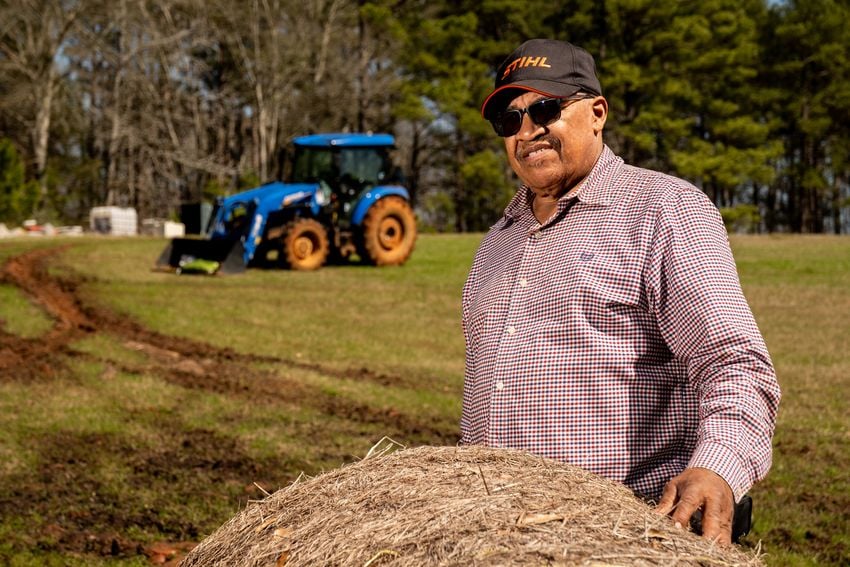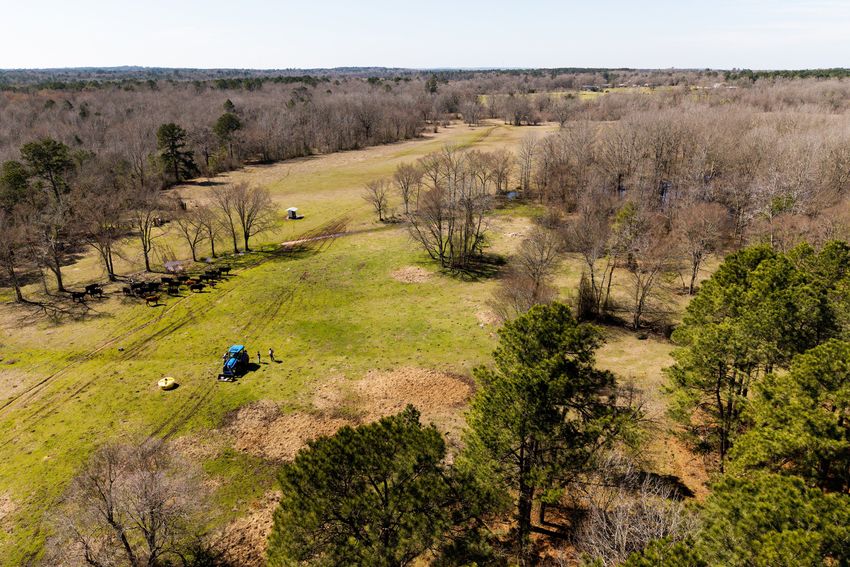
Sign up for The Brief, The Texas Tribune’s daily newsletter that keeps readers up to speed on the most essential Texas news.
NACOGDOCHES — On President Donald Trump’s first day in office, he announced an end to all federally supported diversity, equity and inclusion programs. The implications of this decision have been far-reaching.
It has embroiled the federal government in disputes with colleges and universities. Big cities are reevaluating programs to ensure they don’t lose grants. And Fortune 500 companies seeking favor from the new administration have ended their DEI practices.
And it has frozen cash flow for Black farmers, many of whom live in East Texas.
“Everything is at a standstill,” said Roy Mills, a third-generation East Texas Black farmer. “And we don't know what the end is going to be. We’re getting further behind in all the practices that were being implemented. Things that are supposed to be going on have come to a halt.”
To comply with Trump’s order, the U.S. Department of Agriculture ended its diversity efforts across 14 programs. The department claimed in May to have canceled 3,600 contracts and grants, saving more than $5.5 billion. Applications for assistance moving forward will be reviewed without consideration of an applicant’s race, gender or veteran status.
Mills, who also manages a nonprofit dedicated to farming education with his brother Ike, lost $300,000 in federal grant money to host a conference, he said. More broadly, the funding freeze has delayed the growing season for many. It has halted work on projects that began two and three years ago.
Mills and other Black farmers have said they were unsurprised by Trump's bid to end race-based programs. And they weren’t particularly sad to see them go. The efforts to support Black farmers, they said, have not worked.
Despite the disruption and delays, there is a mustard seed of hope that reprioritizing small farms, which Black-owned farms are primarily, will provide them a better future.
This site is protected by reCAPTCHA and the Google Privacy Policy and Terms of Service apply.
“Endangered species”
Mill’s grandfather, Joshua Mills, bought the family farm in Nacogdoches in 1926. Today, the farm is 200 acres. The primary plot of land serves the cattle operation. The family home sits on several acres next to a large hot house, designed to grow different crops out of season. Greens started sprouting on their own in March. A barn that was once used to farm worms now holds equipment.
While the Mills farm grew over the last century, the population of Black farmers in the U.S. has declined 96%.
DEI programs rarely actually helped Black farmers, said Cindy Ayers Elliott, a doctor of economics, finance and agriculture. She runs an urban farm in Jackson, Mississippi, which has helped reduce the impacts of the food desert. This current freeze is just another example of how the USDA has failed Black farmers like her, she said.
“If I was a turtle, I would be called an endangered species,” said Elliott. “There are less than 40,000 Black Farmers in America overall.”
Former President Joe Biden’s administration made diversity a priority in its farming assistance. However, according to a NPR investigation, just 36% of farmers who identified as Black were granted direct loans, which are supposed to be the easiest to get from the ag department and are targeted to farmers who can’t get credit elsewhere. Meanwhile, 72% of white farmers who applied for the same assistance were approved.
Today, Black farmers make up less than 1% of total producers in the U.S. but there are higher concentrations of them in certain southern states. Texas had the highest number of Black producers in 2022, according to the latest agriculture census. And most of them can be found in East Texas.
But there used to be more.
When Joshua Mills bought his 86 acres in 1926, he was a part of a larger movement of African Americans seeking independence through farming. Through the turmoil of the Jim Crow Era, two World Wars, the Civil Rights Movement and the Vietnam War, Joshua and his descendants grew the family farm.
“They went without food, so they could pay for the land,” Mills said of his father and grandfather.
Mills went to Stephen F. Austin State University to earn a degree in agriculture after serving two years in the U.S. Army in Vietnam. Before taking on the family farm, he taught agriculture at a local high school.
/https://static.texastribune.org/media/files/cff0bac9bb6d657013a3d8b0fbd470c1/0226%20Roy%20Mills%20MC%20TT%2040.jpg)
Today, he is often found in a plaid button-down and jeans. His hands are roughened from decades of hard work, his voice gravelly from years of yelling over the roar of heavy equipment. He’s quick to laugh. And is proud of his work.
Farming has always been a family thing for Mills. Even as he raised his own children, they helped on the farm.
“My sons, they went to the farm with me almost every day when they weren’t in school,” he said. “We were going to do something on the farm whether they enjoyed it or not. But we enjoyed it. Even my daughter.”
He recalled the day she killed her first squirrel with a BB gun.
“That made history,” he said with a laugh.
Farming is unpredictable. Yet, it is a vital component of the U.S. economy. Agriculture contributed $1.5 trillion to the U.S. economy in 2023, according to the U.S. Department of Agriculture Economic Research Service.
“Farming, at the end of the day, is a risky business,” said Gerard D’Souza, Prairie View A&M dean and director of Land Grant Programs. “It depends on a lot of different things, from the weather to government policy to local communities to vibrant farmers markets and neighborhoods.”
To keep up, Mills’ has had his hand in any type of farming business he can, and uses whatever he can from the USDA. He spends his days tending to his cows, preparing for the next season of vegetables and determining the feasibility of cashing in on his tree plantation. He has farmed worms and grown strawberries in his greenhouse.
By and by, however, the land that surrounds his has gone to large-scale farming operations or has been converted into housing or manufacturing.
The amount of land used for agriculture has remained relatively steady for decades, but the number of farms has declined significantly.
In a state like Texas where nearly 90% of farms are considered small, earning less than $50,000 per year, this loss is important — especially for Black farmers.
To help farmers like them, Mills and his brother, Ike, created International Farmers and Ranchers, a coalition of East Texas Farmers, to help their neighbors navigate the complicated USDA system and hopefully stem the tide of closures.
/https://static.texastribune.org/media/files/b962d4b35e37d7df181706f2c37cc150/0226%20Roy%20Mills%20MC%20TT%2001.jpg)
“She wants to have a farm”
Farmers from across the country convened at the June International Farmers and Ranchers conference in Nacogdoches.
On that Friday morning in June, the Nacogdoches County Exposition & Civic Center quickly filled up with farmers and ranchers. Speakers from a broad spectrum of agricultural experts, including lawyers, farmers and policy makers discussed an array of topics. A local high school student spoke about his participation in his high school’s agricultural program.
Part of the room was taken up by people manning booths from universities, such as Prairie View A&M, and nonprofits, such as H.O.P.E. for Small Farm Sustainability from the Rio Grande Valley.
Several farmers came looking for answers on how to move forward.
The USDA had one representative at the conference, but he did not speak. The USDA, however, has released a document detailing what they plan to do for small family farms. This includes streamlining application processes and transitioning farms to the younger generations. The agency also plans to create better access points to credit, farmland, markets, infrastructure, labor, risk management and business tools.
“To ensure small family farmers can start and stay in business for generations to come, USDA is placing specific emphasis on understanding the barriers to starting and keeping small family
farms viable — especially for the next generation,” Rollins wrote in the report. “As USDA implements its action plan, ongoing assessment of gaps in service and support will occur. USDA will continue to measure and spotlight these specific metrics on an annual basis.”
Jacqueline Figg, a Black farmer of Hallettsville, inherited a family cattle ranch in 2019, wants to open a meat processing plant on her property. She’s been waiting for answers on grant funding from the USDA. She has also been waiting for answers on her ability to utilize an existing equipment grant program and other cost sharing measures.
“Some of us were in the middle of implementing these practices, and the contracts were pulled,” Figg said. “It didn't matter that you were in the middle of something.”
Octavia Brown-Reed is a school teacher from Port Arthur. She and her husband have been working hard to send their daughter to Tuskegee University in Alabama. Their daughter is seeking a degree in veterinary medicine, with a specialization in farm animals.
“She wants to have a farm, and she wants to have a veterinarian clinic out of her farm,” Brown-Reed said. “So local ranchers or farmers can come to her and she will treat their animals.”
She has been able to go to school the last two years without incurring debt thanks to a USDA scholarship that covered about $4,000 per year. Brown-Reed is scared that changes at the USDA will strip that support in the fall.
Mills is worried these cuts will affect not only his farm, but also his students’, friends’ and neighbors’. These are people who have come to him for advice or to borrow a tool here and there. Their farms are smaller. Newer.
“It's always the poorest people on the totem pole that will be hit the hardest and for the longest,” he said. “That's every time these things come down.”

The lineup for The Texas Tribune Festival continues to grow! Be there when all-star leaders, innovators and newsmakers take the stage in downtown Austin, Nov. 13–15. The newest additions include comedian, actor and writer John Mulaney; Dallas mayor Eric Johnson; U.S. Sen. Amy Klobuchar, D-Minnesota; New York Media Editor-at-Large Kara Swisher; and U.S. Rep. Veronica Escobar, D-El Paso. Get your tickets today!
TribFest 2025 is presented by JPMorganChase.
Information about the authors
Learn about The Texas Tribune’s policies, including our partnership with The Trust Project to increase transparency in news.
/https://static.texastribune.org/media/profiles/1019_Jess_Huff_2x3.jpeg)